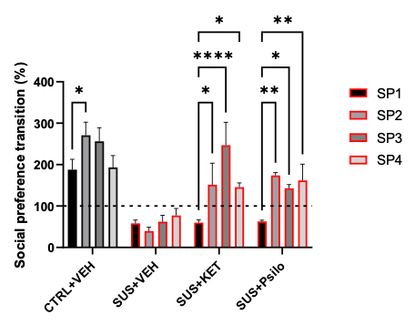Models & Assays
Chronic Social Defeat
The Chronic Social Defeat model is a highly adaptable and translationally relevant model of depression with respect to both behavioral and molecular endpoints, and has been proposed as a key model in antidepressant drug discovery. Possessing excellent etiological, predictive, discriminative and face validity this in vivo model is a valuable research tool in preclinical studies that has the potential to identify new, personalized avenues for depression therapy, including novel compounds based on psilocybin derivatives.
Our validation data clearly indicates:
- ✓ Phenotype division in the C57BL/6J mice population (51% susceptible and 49% resilient to stress)
- ✓ Stability of the susceptible phenotype in the C57BL/6J mice over prolong period of time
- ✓ Acute (24hr) and long lasting (7 and 14 days) antidepressant efficacy of ketamine and psilocybin after just a single administration

n= 5-14 per group. Mean ± SEM, *p < 0.05, **p < 0.01, ****p < 0.0001 vs. baseline. Mixed-effects ANOVA followed by Fisher’s LSD test. SP1 – baseline, SP2 – 24 hr, SP3 – 7 days, SP4 – 14 days post-administration; CTRL -control group, SUS – susceptible, VEH – vehicle, KET – ketamine 10 mg/kg, s.c., Psilo – psilocybin 10 mg/kg, i.p.